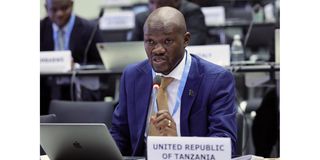New climate funding to benefit Tanzania

What you need to know:
- Tanzania Meteorological Authority (TMA) is currently awaiting approval for its proposal submitted to the World Meteorological Organisation (WMO)
Dar es Salaam. The government is poised to gain funding from the Systematic Observation Financing Facility (SOFF), a significant step that will aid the country in climate mitigation efforts and bolster the provision of nationwide weather forecasts.
SOFF is a financing mechanism that supports countries to close the basic weather and climate observation data gap. SOFF works with countries with the most severe shortfalls in observations, prioritising the least developed countries and small island developing states.
It was co-created by the World Meteorological Organisation (WMO), the United Nations Development Programme (UNDP), and the United Nations Environment Programme (UNEP).
Tanzania Meteorological Authority (TMA) acting director general, Ladislaus Chang'a, told The Citizen during the sidelines of the Masika rainfall season forecast release event that by the end of the upcoming month (March), they anticipate benefiting from the funds.
“We are currently awaiting approval for our proposal submitted to the World Meteorological Organisation (WMO). Once approved, we will secure the necessary facilities to significantly enhance our capability for more accurate weather forecasting and bolster our efforts to mitigate climate impacts,” he said.
He said in developing countries, particularly in Africa, the lack of facilities for data analysis and observation poses significant challenges in providing precise weather forecasts.
“This limitation constrains our ability to accurately gauge temperature fluctuations, measure precipitation levels, and predict future weather patterns. As a result, it becomes challenging to anticipate weather conditions and effectively prepare for potential outcomes,” he notes.
Dr Chang'a, who is also the vice chair of the Intergovernmental Panel on Climate Change (IPCC), emphasised that the establishment of SOFF was to address this issue, particularly benefiting developing countries like Tanzania.
The IPCC is the United Nations body that advances scientific knowledge related to climate change caused by human activities.ii
Dr Chang’a also suggested that upon acquiring the necessary facilities, they aim to extend invitations to all East African countries to participate in training sessions conducted within the country.




